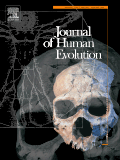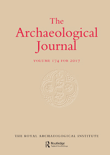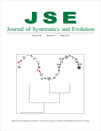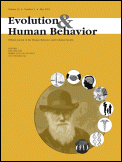
JOURNAL OF HUMAN EVOLUTION
Scope & Guideline
Advancing Knowledge on Human Origins
Introduction
Aims and Scopes
- Paleoanthropology and Hominin Studies:
The journal focuses on the study of hominins, including their anatomy, behavior, and evolutionary relationships. It publishes research on new fossil discoveries, morphological analyses, and implications for the evolutionary tree. - Archaeological Contexts and Cultural Evolution:
Research in this area investigates the archaeological record associated with hominins, including tool use, subsistence strategies, and cultural behaviors. The journal emphasizes the intersection of archaeology and anthropology in understanding human history. - Biological and Environmental Interactions:
The journal examines how environmental factors, such as climate and habitat changes, impact hominin evolution and behavior. This includes studies on dietary adaptations, biomechanical analyses, and ecological contexts. - Technological and Methodological Innovations:
Innovative methodologies, including geometric morphometrics, isotopic analyses, and machine learning applications, are explored to enhance the understanding of hominin evolution and behavior. - Comparative Analyses Across Primates:
The journal often includes comparative studies between hominins and other primates, focusing on evolutionary traits, locomotion, and social behaviors, providing insights into the unique adaptations of humans.
Trending and Emerging
- Integrative Approaches to Hominin Behavior:
There is a growing trend towards interdisciplinary studies that combine archaeological, biological, and ecological data to provide a holistic understanding of hominin behavior, subsistence strategies, and cultural practices. - Technological Advances in Paleoanthropology:
The use of cutting-edge technologies such as 3D modeling, machine learning, and isotopic analysis is on the rise, enhancing the precision of research and expanding the range of questions that can be addressed. - Climate Change and Hominin Adaptations:
Research examining the impacts of climate change on hominin evolution and behaviors is increasingly prominent, reflecting a broader interest in understanding how environmental stressors have shaped human development. - Functional Morphology and Biomechanics:
Emerging studies focusing on the functional aspects of morphology, particularly in relation to locomotion and feeding, are gaining traction, providing insights into the adaptive significance of anatomical traits in hominins. - Behavioral Ecology of Hominins:
There is a notable increase in research exploring the behavioral ecology of early humans and their ancestors, emphasizing social structures, foraging strategies, and interactions with other species.
Declining or Waning
- Classic Hominin Taxonomy:
While taxonomic studies of hominins remain important, there has been a noticeable decrease in papers solely focused on revising or naming new species, as the field moves toward integrating genetic and morphological data. - Paleoecological Studies on Non-Hominin Species:
Research concentrated solely on paleoecological contexts involving non-hominin species has diminished, indicating a shift towards more integrative studies that focus on hominin-specific impacts and interactions with their environments. - Descriptive Studies of Fossil Morphology:
There is a waning interest in purely descriptive morphological studies of fossils without accompanying analytical frameworks or evolutionary implications, as researchers increasingly seek to tie morphology to functional and evolutionary contexts. - Traditional Archaeological Approaches:
Traditional archaeological methodologies, such as basic artifact descriptions and site reports, are declining as the journal emphasizes more interdisciplinary approaches that incorporate advanced technologies and theoretical frameworks.
Similar Journals

GENETICS AND MOLECULAR BIOLOGY
Advancing the frontiers of genetics and molecular biology.GENETICS AND MOLECULAR BIOLOGY, published by the SOC BRASIL GENETICA, is a prominent journal dedicated to the advancement of knowledge in the fields of genetics and molecular biology. Since its inception in 1998, this Open Access journal has served as a vital platform for researchers, professionals, and students to disseminate their findings and engage with the latest innovations and discoveries. With an impact factor that reflects its growing influence, GENETICS AND MOLECULAR BIOLOGY ranks in the Q3 category for both genetics and molecular biology as of 2023, indicating its position within the academic community. The journal is indexed in Scopus, highlighting its commitment to maintaining rigorous peer-review standards while providing wide-reaching access to quality research. Operating out of Ribeirão Preto, Brazil, it fosters a collaborative environment for academic discourse and research development not only in Brazil but also globally. The journal encourages submissions that explore a wide range of topics in genetics and molecular biology, making it an essential resource for anyone involved in these dynamic fields.

Anthropologie-International Journal of Human Diversity and Evolution
Charting the Course of Human Evolutionary StudiesAnthropologie-International Journal of Human Diversity and Evolution is a prominent peer-reviewed journal published by the esteemed MORAVIAN MUSEUM in the heart of the Czech Republic. With a focus on anthropology, this journal serves as a vital platform for the dissemination of innovative research that explores human diversity and evolutionary studies. The journal operates under a rigorous academic framework and is categorized in the Q3 quartile for anthropology in 2023, reflecting its significance in the field. Although it does not currently offer open access options, Anthropologie facilitates the exchange of knowledge through its carefully curated articles spanning diverse topics within human evolution. Its Scopus ranking (320 out of 502 in social sciences) underscores its role as a relevant source for scholars and professionals alike, fostering dialogue and advancements in understanding human diversity. Researchers, students, and practitioners can look forward to engaging content that not only enlightens but also inspires further inquiry into anthropological studies.

Evolutionary Human Sciences
Connecting Disciplines to Illuminate Human EvolutionEvolutionary Human Sciences, published by Cambridge University Press, is a premier open-access journal dedicated to exploring the multidisciplinary intersections of human evolution and behavior. Established in 2019, this journal has swiftly gained recognition, ranking in the Q1 category for Anthropology, Cultural Studies, and Ecology, Evolution, Behavior and Systematics, along with Q2 in Applied Psychology as of 2023. With a commendable Scopus ranking and impact factor reflecting its rigorous academic standards, Evolutionary Human Sciences provides a vital platform for researchers and professionals keen to advance the understanding of human behavior through the lens of evolutionary science. By offering a wealth of open access options, it ensures that groundbreaking research is readily available to scholars, students, and practitioners worldwide, fostering the dissemination of knowledge that is crucial for addressing contemporary challenges in human behavior and ecology.

Archaeological Journal
Unearthing Insights, Shaping Tomorrow's ArchaeologyArchaeological Journal, published by Taylor & Francis Ltd, stands as a leading voice in the field of archaeology, with a remarkable distinction in the Q1 category for both arts and humanities as well as conservation, underscoring its critical role in advancing scholarly dialogue and research. With an ISSN of 0066-5983 and E-ISSN of 2373-2288, this journal provides a platform for innovative research from 1977, now offering insights up to 2024. The United Kingdom-based journal is highly regarded, being within the top 81st percentile in archaeology and conservation according to Scopus rankings. Essential for researchers, professionals, and students, the journal's content spans rigorous archaeological studies, theoretical advancements, and discussions on conservation practices, ultimately aimed at fostering a deeper understanding of humanity's past. Notably, with no open access option, it maintains a traditional publishing approach, thereby ensuring curated and high-quality contributions to the academic community.

Journal of Systematics and Evolution
Unveiling Insights in Systematics and Plant ScienceThe Journal of Systematics and Evolution, published by WILEY, is a premier academic journal dedicated to advancing the fields of Ecology, Evolution, Behavior, and Systematics and Plant Science. With a distinguished Q1 ranking in both of these critical categories in 2023, it stands at the forefront of scientific research, placing it in the top quartile among its peers. Featuring both an ISSN of 1674-4918 and an E-ISSN of 1759-6831, the journal has been converging innovative research since its inception in 2008. The journal caters to a global audience of researchers, professionals, and students, providing a platform for disseminating significant findings and fostering academic dialogue. Its impressive Scopus rankings further affirm its impact, coming in at Rank #62/721 in Ecology and Rank #48/516 in Plant Science, highlighting its relevance and influence in these vibrant fields. As an open-access journal, it ensures that groundbreaking research is accessible to all, thus enhancing collaborative opportunities within the scientific community.

EVOLUTION AND HUMAN BEHAVIOR
Unraveling the Complex Tapestry of Human EvolutionEVOLUTION AND HUMAN BEHAVIOR, published by Elsevier Science Inc, is a leading interdisciplinary journal that explores the intricate relationships between evolutionary processes, human behavior, and cognition. With an impressive impact factor reflecting its rigorous peer-reviewed content and high citation rates, this journal falls in the prestigious Q1 quartile across multiple categories including Arts and Humanities, Ecology, Evolution, Behavior and Systematics, and Experimental and Cognitive Psychology, solidifying its critical role in advancing research in these fields. Since its inception in 1997 and moving towards 2024, it has consistently provided a platform for innovative research and insights, attracting contributions from a diverse range of disciplines. The journal is accessible through various open access options, ensuring that groundbreaking research is widely disseminated for maximum impact. Researchers, professionals, and students alike benefit from the cutting-edge studies published within, making EVOLUTION AND HUMAN BEHAVIOR an essential resource for those looking to deepen their understanding of the evolutionary context of human actions and interactions.

Intersecciones en Antropologia
Advancing anthropological dialogue across borders.Intersecciones en Antropologia, published by the Universidad Nacional del Centro de la Provincia de Buenos Aires (UNICEN), Facultad de Ciencias Sociales, is a premier open-access journal in the field of anthropology, having established its presence since 2010. With an impressive impact factor and currently holding the distinguished Q1 quartile ranking in anthropology for 2023, this journal has quickly become a vital resource for scholars and practitioners alike, offering a platform for innovative research and critical discussion. The journal aims to advance anthropological scholarship by encouraging the dissemination of diverse perspectives and stimulating dialogue across geographical and cultural boundaries. Its open-access model, adopted in 2017, ensures that valuable research findings are accessible to a global audience, fostering collaboration and engagement within the academic community and beyond. Located in the vibrant cultural context of Argentina, Intersecciones en Antropologia serves as a conduit for significant anthropological dialogues, making it an essential read for those dedicated to understanding and contributing to the evolving landscape of social sciences.

Archaeological and Anthropological Sciences
Fostering Academic Exchange Across Time and SpaceArchaeological and Anthropological Sciences is an esteemed peer-reviewed journal published by Springer Heidelberg, specializing in the interdisciplinary fields of archaeology and anthropology. Since its inception in 2009, this journal has established itself as a pivotal resource for researchers and professionals, featuring cutting-edge studies that bridge the gap between the sciences and humanities. With its impressive 2023 Q1 rankings in Anthropology and Archaeology categories, the journal stands out in the Scopus landscape, ranking within the top 5% of its field—Rank #18/413 in Archaeology (Arts and Humanities) and Rank #28/502 in Anthropology. This is complemented by its commitment to disseminating high-quality research to a global audience, despite being a non-Open Access publication. The journal's scope encompasses innovative methodologies, archaeological findings, and anthropological insights that are vital for advancing knowledge and fostering academic discourse. As it moves toward its upcoming converged years, Archaeological and Anthropological Sciences continues to solidify its reputation as a key forum for scholarly exchange in these fields.

Evolutionary Bioinformatics
Bridging disciplines to illuminate evolutionary mysteries.Evolutionary Bioinformatics, published by SAGE Publications Ltd, is a pioneering open-access journal established in 2005, dedicated to advancing the field of evolutionary biology through innovative computational techniques and bioinformatics. With an ISSN of 1176-9343, it serves as a critical platform for researchers, professionals, and students to disseminate impactful findings and foster collaboration across disciplines. The journal spans a broad scope, contributing significantly to the areas of Ecology, Evolution, Behavior and Systematics, and Genetics, as evidenced by its respectable Scopus rankings and quartile placements in 2023. With a commitment to providing comprehensive, peer-reviewed research articles and tools for sharing knowledge, Evolutionary Bioinformatics plays an essential role in shaping the future of evolutionary studies and bioinformatics. Readers and contributors alike are encouraged to engage with cutting-edge research that pushes the boundaries of understanding in this dynamic field.

Journal of Paleolithic Archaeology
Decoding the Narratives of Early HumanityJournal of Paleolithic Archaeology, published by SpringerNature, stands at the forefront of scholarly research in the field of archaeology, focusing specifically on the rich and complex narratives of human prehistory. With an E-ISSN of 2520-8217, this engaging journal serves as a vital resource for researchers, professionals, and students alike, offering open-access articles that disseminate groundbreaking discoveries and theoretical advancements in Paleolithic studies. The journal's objective is to foster a deeper understanding of early human culture, technology, and the environment, ensuring accessibility to vital knowledge that shapes our understanding of human evolution. As the field of archaeology continues to evolve with innovative methodologies and interdisciplinary approaches, the Journal of Paleolithic Archaeology emerges as an essential platform for sharing insights and fostering a vibrant academic community dedicated to unraveling the mysteries of our ancient past.